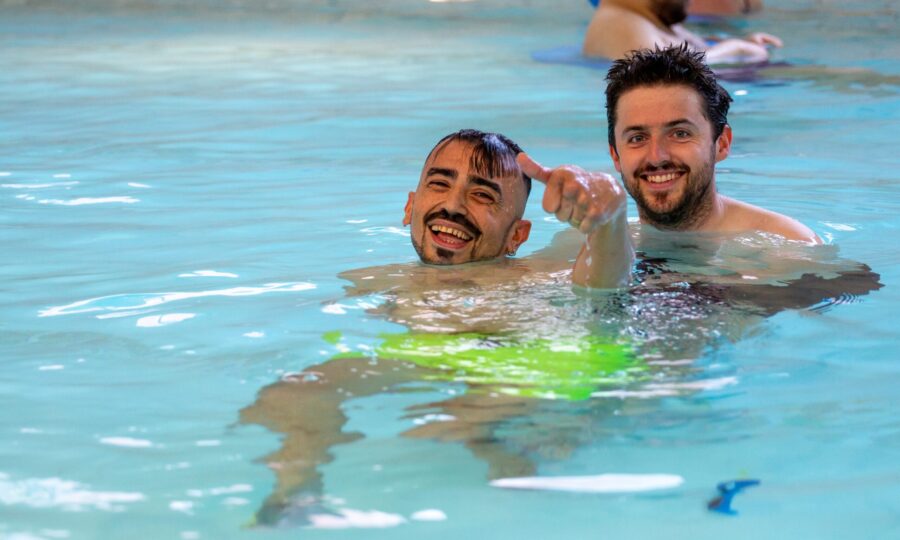Going swimmingly

WeSwim is a swimming club in Old Street that provides accessible swimming sessions for people with disabilities. We caught up with one of the club’s directors, Tash, to find out more.
How did WeSwim come about?
For 10 years, I volunteered at a similar club near Victoria called Pimlico Puffins. It was one of the most rewarding things I’ve done in my life, and I noticed the need for more clubs like it. In London, 21 percent of people are registered as having a disability, yet there are very few community sports clubs around. So, in partnership with the other director Dan, I created WeSwim with the hope to be able to set up more clubs across London so that disabled people don’t have to travel to go swimming somewhere they feel safe and welcome.
We started WeSwim just before the pandemic, but then had to put plans on hold. We have only really been going for 12 months, in which time the community has grown and strengthened. We now have three volunteers who run the Old Street club and its sessions. They are supported by a further 30 volunteers who give their time to support disabled people in the water and get involved in the community. At the moment we have about 15 disabled people coming to our sessions each week, but more are waiting to join the club and more volunteers are waiting in the wings to be trained.
Why is swimming a great choice for people with disabilities who want to exercise?
Swimming is such an immersive experience, you can’t help but be fully focused on it. It brings you into the moment, making you think about your breathing, which is good for your emotional wellbeing, as well as your health. The physical support of the water enables people who have mobility issues to do exercises they can’t do on land. It can be intimidating going to a pool or getting in the water, but once you overcome that barrier, it’s all the more rewarding for it. Swimming is an inclusive sport regardless of people’s level of fitness or technique. We all get together and enjoy our time in the water.
Are there any exercises, games or equipment that you recommend for people who aren’t confident in the pool?
We pride ourselves on our person-centred approach, meaning we work with every individual to ask them what they want out of the session so we can tailor our support. Some people come for exercise or to improve their technique. Some come to see a friendly face and chat while doing some gentle stretches. Volunteers are there to help people get the most out of their session and support them in whatever way works best for them.
What is the ‘social model of disability’ and why have you have you chosen to implement it at WeSwim?
The social model of disability was created by people who have disabilities. It focuses on the barriers that people face in the environment, rather than the people who are affected by them, who are often treated as “the problem”. In our club, we place our focus on the support somebody needs, for example a hoist to get into the water, as opposed to the details of their health condition. There may be many reasons someone uses a wheelchair. It should be their choice whether they share that information with others. It’s not relevant to how we help them.
What do swimmers get out of coming to the club?
The best outcome is when people no longer need our services, because they are able to do it themselves. There are people who have come to WeSwim who hadn’t swum for 10 or 20 years because they were intimidated by mainstream pool sessions, but since coming to us and building up their confidence, they now swim elsewhere without the support of a volunteer, at a time that suits them. Obviously it’s a shame to not have those people around anymore, but it’s fantastic that they no longer face the barriers they once did. It gives us the opportunity to help even more people.
WeSwim recently won Toyota’s Parasport Club of the Month. What does that mean to you?
It’s been incredibly important for two reasons. First, it’s wonderful for the volunteers and swimmers to get the recognition that they so thoroughly deserve for building such a positive community in such a short space of time. Second, the exposure we’ve received from the award is essential for a small non-profit organisation in building credibility and support, which ultimately allows us to launch more clubs and operate sustainably.
What would you say to someone who was thinking about coming along to their first session?
Please get in touch for a chat. We are here to support you to make those first daunting steps. We will show you around and a volunteer will help you meet some fantastic people.
If you’re interested in finding out more, visit the WeSwim Old Street website or get in touch by emailing info@weswim.club
